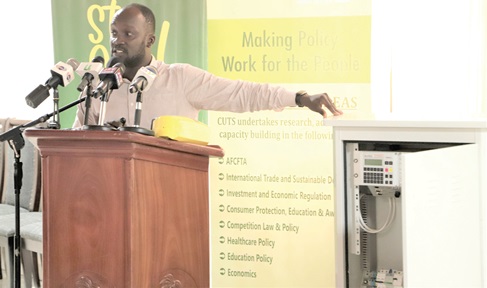
Urban Roads to restore defective traffic lights by Dec
The Department of Urban Roads (DUR) has given an assurance that non-functioning traffic lights will be reactivated by the end of December this year.
DUR said it had already started restoring some of the lights and that the move was part of measures taken by the DUR to restore the lights.
The other measures include an increase in security features of the lights, the construction of the Accra Traffic Management Centre for the effective monitoring of all the traffic lights in the capital city, instructing contractors working on the traffic lights to possess identification cards with QR codes as well as engaging the Ghana Police Service at the divisional level to fashion strategies to protect the equipment providing power for the lights.
Out of a total of 404 traffic lights, 268 are functional while 115 are non-functional with the rest 22 decommissioned.
Thefts, vandalism
A Principal Engineer at the DUR, Neville Dodoo-Quartey, told a Multi-Stakeholder Engagement on Non-functioning Traffic and Street Lights in Accra last Tuesday that thefts and vandalism, among other things, were responsible for most of the lights not functioning.
The well-attended event was organised by the National Road Safety Authority (NRSA), in collaboration with CUTS International, a research and policy think tank.
Mr Dodoo-Quartey named the areas where vandalism and thefts had taken place to include Barnes Road at the TUC Building, Liberia Road/Starlets 91 (Ministries Police Station), JEA Mills High Street (CEPS), Ring Road East/ Police Headquarters, Liberation Road/ 37 Military Hospital area, Liberation Road/ South Liberation Link (Opeibea) and George Walker Bush / Awoshie Road (Baah Yard).
Meanwhile, he said since September this year, traffic lights at some intersections had been restored and that they comprised the Nsawam Road/Apenkwa West Bound, Freetown Road/ Trinity Road, Spintex Road/Hydrafoam Junction, Tema/Ashaiman Overpass, Boundary Road/AH Hotel, Liberation Road/Airport By Pass, Kanda Highway/ Castle Road, Kojo Thompson Road/Selwyn Market and the Starlets 91 Road/Nationalism Park.
Per the statistics from the DUR, 236 traffic lights are in Greater Accra, 61 in Ashanti, 21 in Western, 18 in Eastern, 16 in Central, 13 in the Upper East, 11 in Volta, 15 in Bono East, six in Bono, four in Northern and three in Upper West.
The rest of the regions do not have traffic lights.
Three contractors are in charge of the lights. They are Dakal Construction, Facol Limited and Angel Data
Mr Dodoo-Quartey called for the support of all to deal with the problem of thefts and vandalism since it cost so much to replace the equipment.
They have weekly checks done by the DUR regional offices and that was what they did to pay contractors, adding that if they go to an intersection and they see, for instance, red and green on, one third of the contractor’s money is taken away”.
The acting Director-General of the NRSA, David Adonteng, said, among other things, that the last time the authority did a survey, over 90 per cent of street lights were not working.
He mentioned places such as the Accra-Tema Motorway, the N1 Highway as well as Mallam and beyond.
That situation meant that motorists faced a number of challenges as visibility became very poor.
Mr Adonteng noted that the traffic lights and street lights were two major components within the road safety management chain.
He said as the harmattan season approached, the lights were needed to enable motorists to traverse the roads and manoeuvre to safety.
“The responsibility is not only on the NRSA because we have said several times and we keep saying that the responsibility of having safety in this country and everywhere across the world is a shared and a collective one.
Road safety
The West Africa Regional Director for CUTS International, Appiah Adomako, said the issue of road safety was something that affected everyone.
“One thing that we need to know as a nation and as a people is that we need to be very alert whenever we go around.
When street lights are not functioning, the government agencies are not God to be able to know that things are not working, sometimes it requires you and I to be able to report,” he said.
In a presentation, the Principal Planning Officer of the NRSA, Dennis Yeribu, said six people were killed every day on the roads in the country.
